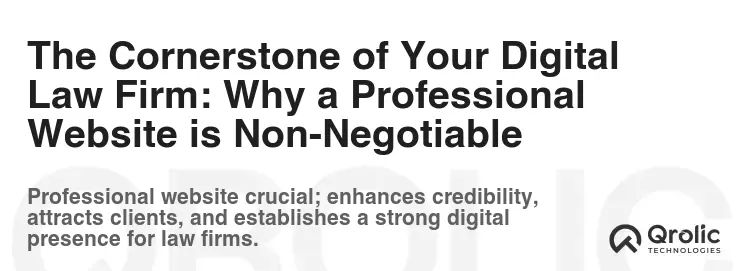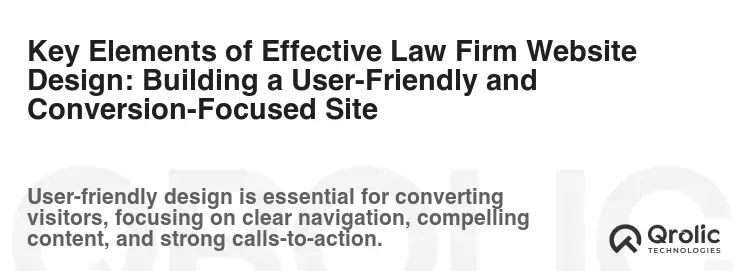Quick Summary:
- Your professional law firm website is non-negotiable.
- Tailor your site to target clients and mobile users.
- Optimize with SEO, then maintain and update regularly.
Table of Contents
- The Cornerstone of Your Digital Law Firm: Why a Professional Website is Non-Negotiable
- The High Stakes: Consequences of a Subpar Website
- The Power of First Impressions: Capturing Attention Immediately
- Understanding Your Target Audience: Tailoring Your Website for Client Acquisition
- Identifying Your Ideal Client Profile
- Speaking Their Language: Crafting Content That Connects
- Mobile-First Approach: Catering to the On-the-Go Client
- Key Elements of Effective Law Firm Website Design: Building a User-Friendly and Conversion-Focused Site
- Homepage: Making a Strong First Impression
- Practice Area Pages: Showcasing Your Expertise
- Attorney Profiles: Building Trust and Credibility
- Contact Page: Making it Easy to Connect
- Blog: Establishing Thought Leadership and Driving Traffic
- SEO for Law Firms: Optimizing Your Website for Search Engine Visibility
- Keyword Research: Identifying the Right Terms
- On-Page Optimization: Optimizing Your Website Content
- Off-Page Optimization: Building Authority and Backlinks
- Local SEO: Targeting Clients in Your Geographic Area
- Legal Website Design Services: Choosing the Right Partner for Your Firm
- Experience and Expertise: Proven Track Record in Legal Website Development
- Design and Development Capabilities: Creating a Visually Appealing and Functional Website
- SEO Expertise: Optimizing Your Website for Search Engines
- Communication and Collaboration: Working Together to Achieve Your Goals
- Cost and Value: Finding the Right Balance
- The Power of Qrolic Technologies: Your Partner in Legal Website Development
- Why Choose Qrolic Technologies?
- Our Services
- Get Started Today
- Ongoing Maintenance and Updates: Keeping Your Website Fresh and Effective
- Website Security: Protecting Your Firm and Client Data
- Content Updates: Keeping Your Website Relevant and Engaging
- Performance Monitoring: Ensuring Optimal Website Speed and User Experience
The Cornerstone of Your Digital Law Firm: Why a Professional Website is Non-Negotiable

In today’s digital age, your law firm’s website is often the first (and sometimes only) impression you make on potential clients. It’s your virtual storefront, your 24/7 marketing tool, and your opportunity to showcase your expertise and build trust. A poorly designed or outdated website can deter potential clients, damage your reputation, and ultimately cost you business. Investing in professional law firm website development isn’t just an expense; it’s a critical investment in the future of your practice.
The High Stakes: Consequences of a Subpar Website
Consider the potential consequences of neglecting your website:
- Lost Opportunities: Potential clients may immediately dismiss your firm if your website appears unprofessional or outdated. They’ll likely move on to a competitor with a more compelling online presence.
- Damaged Reputation: A clunky, slow, or confusing website can project an image of incompetence or carelessness, undermining the trust you need to establish with potential clients facing serious legal challenges.
- Poor Search Engine Rankings: Without proper SEO (Search Engine Optimization), your website won’t rank well in search results, making it difficult for potential clients to find you organically. This necessitates costly advertising to compensate for poor organic visibility.
- Missed Communication: If your website lacks clear contact information or easy-to-use communication channels, you’ll miss opportunities to connect with prospective clients.
- Competitive Disadvantage: Law firms with modern, user-friendly websites have a significant advantage over those with outdated or poorly designed sites. They attract more clients, build stronger brands, and ultimately achieve greater success.
The Power of First Impressions: Capturing Attention Immediately
Studies show that you have mere seconds to capture a visitor’s attention when they land on your website. A visually appealing, well-structured website that clearly communicates your value proposition is essential for making a positive first impression. This includes:
- Professional Design: A clean, modern design that reflects your firm’s brand and expertise.
- Clear Messaging: Concise and compelling language that highlights your key services and the benefits you offer clients.
- High-Quality Images: Professional photos and videos that enhance your website’s visual appeal and build trust.
- Easy Navigation: A user-friendly navigation system that allows visitors to quickly find the information they need.
- Mobile Responsiveness: A website that is optimized for viewing on all devices, including smartphones and tablets.
Understanding Your Target Audience: Tailoring Your Website for Client Acquisition

Before embarking on law firm website development, it’s crucial to understand your target audience. Who are you trying to reach? What are their needs and pain points? What type of legal services are they seeking?
Identifying Your Ideal Client Profile
Consider these factors when defining your ideal client profile:
- Demographics: Age, location, income, education level.
- Legal Needs: Specific areas of law they require assistance with (e.g., family law, criminal defense, personal injury).
- Pain Points: The challenges and frustrations they face related to their legal issues.
- Online Behavior: How they search for legal information and services online.
By understanding your target audience, you can tailor your website’s content, design, and messaging to resonate with them. This will increase engagement, generate leads, and ultimately drive more business to your firm.
Speaking Their Language: Crafting Content That Connects
Once you understand your target audience, you need to speak their language. Avoid legal jargon and use clear, concise language that is easy to understand. Focus on the benefits you offer clients, rather than simply listing your services.
- Use Client-Centric Language: Frame your messaging from the client’s perspective. Instead of saying “We specialize in real estate law,” say “We help clients navigate complex real estate transactions.”
- Address Their Pain Points: Acknowledge the challenges and frustrations your target audience faces. Show them that you understand their situation and have the expertise to help.
- Highlight Your Value Proposition: Clearly communicate the unique benefits you offer clients. What makes your firm different from the competition?
- Provide Valuable Content: Create blog posts, articles, and guides that address common legal questions and concerns. This will establish you as a trusted authority and attract potential clients to your website.
Mobile-First Approach: Catering to the On-the-Go Client
In today’s mobile-first world, it’s essential to prioritize mobile responsiveness in your legal website design services. A significant percentage of website traffic now comes from mobile devices, and this trend is only expected to continue.
- Responsive Design: Ensure your website adapts seamlessly to different screen sizes and resolutions.
- Fast Loading Times: Optimize your website for mobile devices to ensure fast loading times, which are crucial for user experience.
- Easy Navigation: Make it easy for mobile users to navigate your website and find the information they need.
- Click-to-Call Functionality: Include click-to-call buttons on your website to allow mobile users to easily contact you.
Key Elements of Effective Law Firm Website Design: Building a User-Friendly and Conversion-Focused Site

An effective law firm website should be both visually appealing and highly functional. It should provide a positive user experience, showcase your expertise, and generate leads. Here are some key elements to consider:
Homepage: Making a Strong First Impression
Your homepage is your website’s front door. It should immediately grab the visitor’s attention and clearly communicate your firm’s value proposition.
- Compelling Headline: Use a clear and concise headline that highlights your key services and the benefits you offer clients.
- Engaging Visuals: Use high-quality images and videos to enhance your website’s visual appeal.
- Clear Call to Action: Include prominent calls to action that encourage visitors to contact you or learn more about your services.
- Easy Navigation: Make it easy for visitors to navigate your website and find the information they need.
- Trust Signals: Include testimonials, awards, and other trust signals to build credibility.
Practice Area Pages: Showcasing Your Expertise
Your practice area pages should provide detailed information about the specific legal services you offer.
- Detailed Descriptions: Provide comprehensive descriptions of each practice area, highlighting your experience and expertise.
- Case Studies: Showcase successful case studies to demonstrate your ability to achieve positive outcomes for clients.
- Attorney Profiles: Include attorney profiles that highlight their experience, qualifications, and areas of expertise.
- Relevant Content: Provide valuable content related to each practice area, such as blog posts, articles, and guides.
Attorney Profiles: Building Trust and Credibility
Attorney profiles are an essential part of any law firm website. They allow potential clients to learn more about the attorneys who will be representing them.
- Professional Photos: Include professional headshots of each attorney.
- Detailed Biographies: Provide detailed biographies that highlight their experience, qualifications, and areas of expertise.
- Education and Certifications: List their education, certifications, and professional affiliations.
- Awards and Recognition: Highlight any awards or recognition they have received.
- Contact Information: Include their contact information, including phone number and email address.
Contact Page: Making it Easy to Connect
Your contact page should make it easy for potential clients to connect with you.
- Contact Form: Include a contact form that allows visitors to easily submit inquiries.
- Phone Number and Email Address: Display your phone number and email address prominently.
- Office Address: Include your office address and a map to your location.
- Social Media Links: Include links to your social media profiles.
Blog: Establishing Thought Leadership and Driving Traffic
A blog is a powerful tool for establishing thought leadership, attracting potential clients, and improving your website’s SEO.
- Valuable Content: Create blog posts that address common legal questions and concerns.
- Relevant Topics: Focus on topics that are relevant to your target audience and your areas of practice.
- Consistent Posting: Post regularly to keep your blog fresh and engaging.
- SEO Optimization: Optimize your blog posts for search engines to improve your website’s ranking.
- Social Sharing: Encourage readers to share your blog posts on social media.
SEO for Law Firms: Optimizing Your Website for Search Engine Visibility

SEO (Search Engine Optimization) is the process of optimizing your website to rank higher in search engine results pages (SERPs). This is essential for driving organic traffic to your website and attracting potential clients.
Keyword Research: Identifying the Right Terms
The first step in SEO is keyword research. This involves identifying the keywords and phrases that potential clients are using to search for legal services online.
- Brainstorming: Start by brainstorming a list of keywords related to your areas of practice.
- Keyword Tools: Use keyword research tools like Google Keyword Planner, Ahrefs, and SEMrush to identify high-volume, low-competition keywords.
- Long-Tail Keywords: Focus on long-tail keywords (longer, more specific phrases) to target a more niche audience.
- Location-Based Keywords: Include location-based keywords (e.g., “personal injury lawyer Los Angeles”) to target clients in your local area.
On-Page Optimization: Optimizing Your Website Content
On-page optimization involves optimizing your website’s content and structure to improve its ranking in search results.
- Title Tags: Optimize your title tags with relevant keywords.
- Meta Descriptions: Write compelling meta descriptions that entice users to click on your website.
- Header Tags: Use header tags (H1, H2, H3, etc.) to structure your content and highlight important keywords.
- Content Optimization: Optimize your website content with relevant keywords and phrases.
- Image Optimization: Optimize your images with descriptive alt text.
- Internal Linking: Link to other relevant pages on your website to improve navigation and SEO.
Off-Page Optimization: Building Authority and Backlinks
Off-page optimization involves building your website’s authority and reputation through backlinks.
- Backlinks: Earn backlinks from other reputable websites in your industry.
- Guest Blogging: Write guest posts for other websites in your industry.
- Directory Listings: List your website in online directories.
- Social Media Marketing: Promote your website on social media.
- Online Reviews: Encourage clients to leave positive reviews on online review platforms.
Local SEO: Targeting Clients in Your Geographic Area
Local SEO is the process of optimizing your website to rank higher in local search results. This is essential for attracting clients in your local area.
- Google My Business: Claim and optimize your Google My Business listing.
- NAP Citations: Ensure your name, address, and phone number (NAP) are consistent across all online directories and listings.
- Local Keywords: Use local keywords (e.g., “divorce lawyer Chicago”) in your website content and metadata.
- Local Link Building: Earn backlinks from other local businesses and organizations.
Legal Website Design Services: Choosing the Right Partner for Your Firm

Choosing the right attorney web design agency is crucial for the success of your website. Here are some factors to consider:
Experience and Expertise: Proven Track Record in Legal Website Development
Look for an agency with a proven track record in law firm website development. They should have a deep understanding of the legal industry and the unique challenges faced by law firms.
- Portfolio: Review their portfolio to see examples of their work.
- Testimonials: Read testimonials from other law firms they have worked with.
- Case Studies: Ask for case studies that demonstrate their ability to achieve positive results for clients.
Design and Development Capabilities: Creating a Visually Appealing and Functional Website
The agency should have strong design and development capabilities to create a visually appealing and functional website.
- Design Skills: They should be able to create a website that is both visually appealing and user-friendly.
- Development Skills: They should be proficient in the latest web technologies and be able to create a website that is fast, secure, and mobile-responsive.
- Content Management System (CMS): They should be able to build your website on a robust CMS like wordpress that allows you to easily manage your content.
SEO Expertise: Optimizing Your Website for Search Engines
The agency should have strong SEO expertise to optimize your website for search engines.
- Keyword Research: They should be able to conduct thorough keyword research to identify the right keywords for your target audience.
- On-Page Optimization: They should be able to optimize your website content and structure for search engines.
- Off-Page Optimization: They should be able to build your website’s authority and reputation through backlinks.
Communication and Collaboration: Working Together to Achieve Your Goals
The agency should be communicative and collaborative, working closely with you to understand your needs and goals.
- Regular Communication: They should provide regular updates and communicate clearly throughout the project.
- Collaboration: They should be willing to collaborate with you on all aspects of the project, from design to content creation.
- Project Management: They should have a clear project management process to ensure the project stays on track and within budget.
Cost and Value: Finding the Right Balance
Consider the cost and value of the agency’s services. Don’t simply choose the cheapest option; instead, focus on finding an agency that offers the best value for your investment.
- Transparent Pricing: They should provide transparent pricing and a clear breakdown of costs.
- Return on Investment (ROI): They should be able to demonstrate how their services will generate a positive ROI for your firm.
- Long-Term Partnership: Look for an agency that is interested in building a long-term partnership with your firm.
The Power of Qrolic Technologies: Your Partner in Legal Website Development

At Qrolic Technologies (https://qrolic.com/), we understand the unique needs of law firms and the importance of a strong online presence. We offer comprehensive legal website design services that are tailored to your specific needs and goals.
Why Choose Qrolic Technologies?
- Extensive Experience: We have years of experience working with law firms of all sizes, helping them to build successful online presences.
- Expert Team: Our team of designers, developers, and SEO experts is dedicated to providing the highest quality services.
- Custom Solutions: We create custom websites that are tailored to your specific brand and target audience.
- Proven Results: We have a proven track record of helping law firms to improve their search engine rankings, generate leads, and attract new clients.
- Client-Focused Approach: We are committed to providing excellent customer service and building long-term relationships with our clients.
Our Services
- Website Design and Development: We create visually appealing and functional websites that are optimized for search engines.
- SEO Services: We offer comprehensive SEO services to help you improve your website’s ranking in search results.
- Content Marketing: We create valuable content that attracts potential clients to your website.
- Social Media Marketing: We help you build your brand and connect with potential clients on social media.
- Pay-Per-Click (PPC) Advertising: We manage your PPC campaigns to drive targeted traffic to your website.
Get Started Today
Contact Qrolic Technologies (https://qrolic.com/) today to learn more about our law firm website development services and how we can help you grow your practice online. We offer a free consultation to discuss your needs and goals. Let us help you create a website that attracts clients, builds trust, and drives results.
Ongoing Maintenance and Updates: Keeping Your Website Fresh and Effective

Once your website is launched, it’s important to keep it fresh and effective by performing regular maintenance and updates.
Website Security: Protecting Your Firm and Client Data
Website security is paramount, especially for law firms handling sensitive client data. Regular security audits and updates are essential to protect your website from cyber threats.
- SSL Certificate: Ensure your website has an SSL certificate to encrypt data transmitted between your website and visitors.
- Regular Updates: Keep your CMS, plugins, and themes up to date with the latest security patches.
- Strong Passwords: Use strong, unique passwords for all of your website accounts.
- Firewall: Implement a website firewall to protect against malicious traffic.
- Backups: Regularly back up your website data to ensure you can recover from any security breaches.
Content Updates: Keeping Your Website Relevant and Engaging
Regularly update your website content to keep it relevant and engaging for visitors.
- New Blog Posts: Publish new blog posts regularly to provide valuable content and improve your website’s SEO.
- Updated Information: Update your website content with the latest information about your services, attorneys, and practice areas.
- New Case Studies: Add new case studies to showcase your successes and demonstrate your expertise.
- Testimonials: Collect and display new testimonials from satisfied clients.
Performance Monitoring: Ensuring Optimal Website Speed and User Experience
Monitor your website’s performance to ensure it is loading quickly and providing a positive user experience.
- Website Speed Tests: Regularly test your website’s speed using tools like Google PageSpeed Insights and GTmetrix.
- Mobile Responsiveness: Ensure your website is still responsive and provides a good user experience on all devices.
- User Feedback: Solicit feedback from users to identify areas for improvement.
- Analytics Tracking: Track your website’s traffic and user behavior using Google Analytics to identify trends and areas for optimization.
By investing in ongoing maintenance and updates, you can ensure that your website remains a valuable asset for your law firm for years to come. Your website should be a dynamic and evolving reflection of your firm’s expertise and commitment to serving your clients. It’s not a one-time project, but an ongoing investment in your firm’s future.









